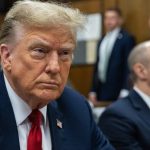Police estimated more than 200,000 people converged on the Polish capital on Sunday to mark the centenary of the country’s hard-fought independence in 1918. Jaroslaw Kaczynski, the leader of the governing party and Poland’s most powerful politician, said the event was a “great success.” Meanwhile, French President Emmanuel Macron was slamming the rise of nationalism that threatens to undermine the European Union.
Poland has been at vanguard of the nativism and protectionism championed by Donald Trump, but the show of strength exposed how the line between patriotism and extremism has become even more blurred. There was a tense atmosphere in Warsaw as officials led a march of people with red-and-white national flags and armbands. Behind them were emblems from fascist groups, with police and the military forming barricades.
It contrasted with the scene on the outskirts of Paris over two days. Macron embraced German Chancellor Angela Merkel as they took part in a simple ceremony that commemorated Franco-German reconciliation after two world wars that devastated swathes of Europe, especially Poland.
“Poland’s celebrations show just how much it’s detached from geopolitics,” said Ewa Marciniak, a political scientist at Warsaw University. “It’s clear that Poland wasn’t only out of tune with that of EU leaders, but it’s as if it was singing a different song.”
Opponents say the government is giving a voice to racism with its them-against-us rhetoric making western Europe and immigration the enemy. The commemoration attracted nationalists from Hungary, Italy and the U.K. There was also at least one Serbian flag.
One man from Budapest posing for photographs said his country stood side by side with Poland when it comes to challenging the EU mainstream. Both Poland and Hungary have been threatened by EU sanctions, with each country promising to veto them.
Indeed, the Law & Justice government has been struggling to keep control of the political narrative. The party failed to gain much ground in Polish urban areas in local elections recently as rumors swirled about its commitment to EU membership. Poland has clashed with Brussels over the past three years over a power grab of the courts, media freedom and a new defamation law tied to the country’s role in the Holocaust.
The government rejects accusations it’s leading Poland out of the EU. It was eager to avoid a repetition of last year’s scenes on Independence Day when it was hijacked by fascists. There were no slogans this time such as “Pure Blood” and “Europe Will Be White or Uninhabited.” Earlier in the day, some held a large banner declaring “Death to the Enemies of the Fatherland.”
Kaczynski praised the march, while Trump tweeted a congratulatory message to Poland. “We are happy,” Kaczynski said. “It’s a great day.” Nationalists following the official government delegation, though, tweeted about burning the EU flag and crowds chanted to take Poland out of the alliance it joined with other former Eastern Bloc nations in 2004.
EU President Donald Tusk, a former Polish prime minister, called on Poles to follow in the footsteps of historic leaders who confronted the Russian army and toppled communism so they can defeat the “modern Bolsheviks” currently ruling the country. Notably, he chose to visit Warsaw on Sunday while world leaders gathered in France.
Near Warsaw’s Palace of Culture, the tower that dominates the center of the city, a few dozen anti-fascist demonstrators held a banner with a photograph of the Auschwitz death camp and the caption “This Is How Nationalism Ends.” Some passersby shouted insults and racist slurs at the small gathering.
“This isn’t just a problem for the government, this is a problem for all of us,” said Marek Migalski, a political scientist at Silesian University in Katowice, told private broadcaster TVN24 on Sunday. “Poland has become the capital of nationalism.” DM





















 Become an Insider
Become an Insider